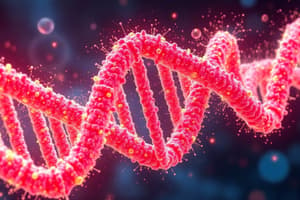Podcast
Questions and Answers
What is the main function of the human genome?
What is the main function of the human genome?
- To contain all the DNA molecules in a cell
- To determine the number of mitochondria in a cell
- To produce sex cells with 46 molecules of nuclear DNA
- To regulate the development of individual characteristics (correct)
How many molecules of nuclear DNA do somatic cells contain?
How many molecules of nuclear DNA do somatic cells contain?
- 50 (diploid set)
- 24 (haploid set)
- 23 (haploid set)
- 46 (diploid set) (correct)
What is the function of the karyotype in the human genome?
What is the function of the karyotype in the human genome?
- To contain the genes in somatic cells (correct)
- To form the plasmotype
- To organize mitochondrial DNA
- To ensure the development of individual characteristics
How many different chromosomes are present in the human karyotype?
How many different chromosomes are present in the human karyotype?
What contributes to the varying number of mitochondrial DNA molecules in different cells?
What contributes to the varying number of mitochondrial DNA molecules in different cells?
How many molecules of nuclear DNA do sex cells contain?
How many molecules of nuclear DNA do sex cells contain?
What is the approximate number of genes contained in the 46 DNA molecules in somatic cells?
What is the approximate number of genes contained in the 46 DNA molecules in somatic cells?
What contributes to the varying number of mitochondrial DNA molecules in different cells?
What contributes to the varying number of mitochondrial DNA molecules in different cells?
What is the main difference between the karyotype and the plasmotype in the human genome?
What is the main difference between the karyotype and the plasmotype in the human genome?
How many different chromosomes are present in the human karyotype?
How many different chromosomes are present in the human karyotype?
Flashcards are hidden until you start studying
Study Notes
Human Genome Basics
- The main function of the human genome is to provide the genetic instructions for the development and function of an organism.
Nuclear DNA
- Somatic cells contain 2 molecules of nuclear DNA.
- Sex cells, on the other hand, contain 1 molecule of nuclear DNA.
- The 46 DNA molecules in somatic cells contain approximately 20,000-25,000 genes.
Mitochondrial DNA
- The number of mitochondrial DNA molecules varies between cells due to the process of mitochondrial replication, which occurs independently of nuclear DNA replication.
- Mitochondrial DNA is responsible for generating energy for the cell through cellular respiration.
Karyotype
- The human karyotype consists of 23 different chromosome pairs, for a total of 46 chromosomes.
- The function of the karyotype is to provide a complete picture of an individual's chromosomes, allowing for the identification of chromosomal abnormalities.
- In contrast to the karyotype, the plasmotype refers to the complete set of genetic material found in plasmids, which are small, circular DNA molecules found in bacteria.
Key Distinctions
- The main difference between the karyotype and the plasmotype is the source of the genetic material: the karyotype is found in the nucleus of eukaryotic cells, while the plasmotype is found in prokaryotic cells.
Studying That Suits You
Use AI to generate personalized quizzes and flashcards to suit your learning preferences.


